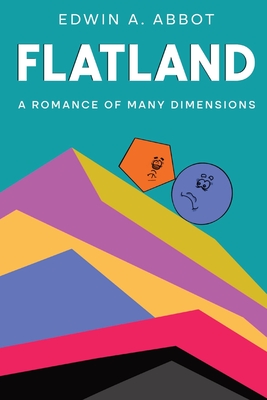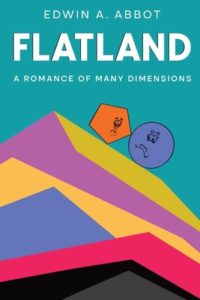Section 21: How I tried to teach the Theory of Three Dimensions to my Grandson, and with what success
bySection 21 – Flatland begins with renewed hope that enlightenment might spring from youth, as the narrator reaches out to his Grandson, remembering the boy’s earlier comments about dimensions beyond two. Confident that this fresh mind could grasp what older ones could not, he attempts to explain the meaning of a third spatial direction—one that does not follow the cardinal plane but instead moves “upward.” The theory, while simple enough in isolation, proves frustratingly difficult to communicate in a world that has no concept of height. With every example and diagram he tries, the clarity of his knowledge only highlights the limits of Flatland’s perspective. The direction he now calls “up” cannot be compared to any known pathway in their world. Instead of enlightenment, he’s met with confusion and, eventually, ridicule. As his Grandson grows increasingly irritated, their conversation breaks down entirely.
Undeterred by this failure, the narrator begins to see that the task before him is not simply about explaining geometry—it is about changing the very structure of thought. He realizes that Flatland is bound by more than its physical dimensions; its culture is just as rigid. Each citizen lives within strict class divisions, behavioral rules, and cognitive limitations that prevent them from imagining anything outside the prescribed norm. This makes the teaching of a third dimension not only difficult but dangerous. Society rewards conformity and punishes those who think differently. The narrator starts to perceive himself not as a teacher, but as a threat in the eyes of others. Still, he believes that the truth is too important to remain hidden. If others could feel, even briefly, the awe and expansion he experienced upon learning of the Sphere, perhaps a revolution of thought could begin.
The attempt to teach his Grandson becomes symbolic of the broader struggle to introduce new ideas into resistant societies. History is replete with innovators and scientists who were branded heretics or madmen before their insights were understood. From Galileo to Darwin, progress often begins with disbelief. The narrator now sees that enlightenment requires not only evidence but also imagination—something in short supply in Flatland. He begins to plan his next steps more carefully, aware that any further attempts could attract attention from those in power. The governing class, after all, maintains their authority by keeping others ignorant of what lies beyond. For those interested in higher truths, secrecy becomes a necessity.
As he prepares to write about the Third Dimension in a form that others might accept, he chooses allegory and abstraction. He avoids direct reference to the Sphere or his journey outside Flatland. Instead, he couches his knowledge in metaphors, comparing the unseen upward to things that Flatlanders already know—shadows, reflections, changes in temperature, or dreams. He hopes that subtlety will plant seeds of doubt in the minds of others. Perhaps, in time, those seeds will grow into curiosity. And curiosity, he believes, is the first crack in the wall of ignorance. He works late into the night, recording his experience not just for his Grandson, but for anyone brave enough to think beyond what they are told is real.
The struggle between knowledge and dogma, between personal revelation and public ridicule, becomes the dominant theme of his reflections. He begins to understand why the Sphere left him so quickly, offering wisdom but little support. It is not enough to be shown a new world; one must also carry the burden of knowing it. That burden now rests squarely on the narrator’s shoulders. He knows he cannot force others to believe, but he can record what he has learned. And maybe, just maybe, someone else will read it with an open mind. The chapter closes with that fragile hope.


